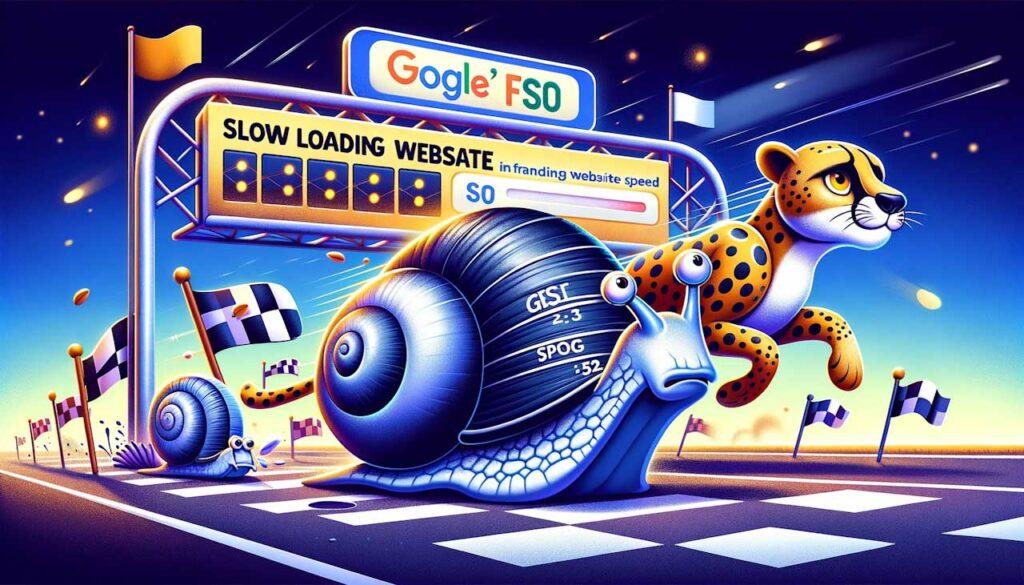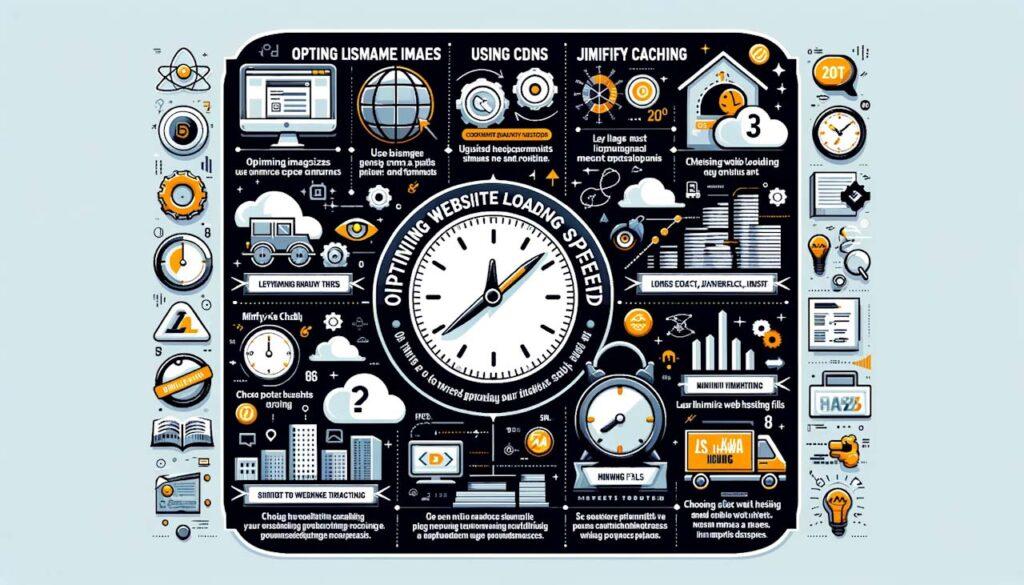In today’s digital age, website loading speed has become a crucial factor for local businesses when it comes to their marketing efforts. The impact of website loading speed on local business marketing cannot be underestimated.

Slow loading websites can lead to a poor user experience, resulting in potential customers leaving the site and seeking services elsewhere. Research has shown that even a one-second delay in page load time can lead to a significant decrease in conversions and an overall negative impact on a local business’s reputation.
Furthermore, the connection between website loading speed and local business SEO is undeniable. Search engines, like Google, take into consideration the loading speed of websites when determining their rankings in search results. A slow-loading website will be penalised by search engines, leading to lower visibility and less organic traffic.
For local businesses trying to improve their online presence and attract new customers, optimising website loading speed is a crucial step in their marketing strategy. With the growing emphasis on mobile browsing, it’s important for local businesses to ensure their websites are not only fast-loading on desktops but also mobile-friendly.
With more users accessing websites on their smartphones, a slow-loading website can hinder their experience and drive them away from engaging with the business. In conclusion, the impact of website loading speed on local business marketing is undeniable.
By prioritising and optimising loading speeds, local businesses can improve user experience, boost their online visibility, and ultimately increase conversions and revenue.
- Slow loading websites can result in a poor user experience, causing potential customers to leave the site and seek services elsewhere.
- Even a one-second delay in page load time can lead to a significant decrease in conversions and negatively impact a local business’s reputation.
- Search engines, such as Google, consider website loading speed when determining rankings in search results. A slow-loading website will be penalised, resulting in lower visibility and less organic traffic.
- Local businesses need to optimise their website loading speed not only for desktop users but also for mobile users. With the increasing number of people accessing websites on smartphones, a slow-loading website can drive them away from engaging with the business.
- Prioritising and optimising loading speeds can improve user experience, increase online visibility, and ultimately boost conversions and revenue for local businesses.
Understanding the Importance of Fast Loading Websites for Local Businesses
In today’s digital age, having a fast loading website has become crucial for local businesses to thrive in their marketing efforts. As potential customers browse the internet in search of products and services, they expect websites to load quickly and deliver the information they need with minimal waiting time.

A slow loading website not only frustrates users but also hampers the overall user experience, leading to high bounce rates and lost business opportunities.
The importance of fast loading websites for local businesses cannot be underestimated.
Firstly, it enhances user experience, ensuring that visitors stay on the website longer, explore different pages, and ultimately convert into customers. A fast website creates a positive impression, reflecting the business’s professionalism and dedication to customer satisfaction.
Additionally, fast loading websites are favoured by search engines, improving organic search rankings and visibility for local businesses. This means that a website’s loading speed directly impacts its online presence and the ability to reach a wider local audience.
To stay competitive in today’s digital landscape, local businesses must prioritise optimising their website loading speed, as it plays a crucial role in attracting and retaining customers.
Factors Affecting Website Loading Speed and How They Impact Local Business Marketing
Page loading speed is a critical factor that can greatly impact the success of a local business’s online marketing efforts.
Several factors can contribute to a website’s loading speed, such as the size and complexity of the web page content, server response time, and the efficiency of the website’s code. When a website takes too long to load, it can have a detrimental effect on the user experience and ultimately affect the business’s reputation.
Firstly, the size and complexity of the web page content play a significant role in website loading speed. Large image files, excessive use of plugins or scripts, and heavy multimedia content can all slow down a website’s loading time.
Local businesses need to optimise their website’s content to strike a balance between providing valuable information and ensuring a speedy loading experience for their visitors.
Secondly, the server response time can impact how quickly a web page loads. When a user clicks on a website link, their browser sends a request to the site’s server, which then retrieves the necessary files and transmits them back to the user’s browser. If the server takes too long to process these requests, it will prolong the website’s loading time.
Local businesses should evaluate their hosting providers and consider upgrading to a faster and more reliable server to improve their loading times and avoid frustrating potential customers.
How Slow Loading Websites Negatively Affect User Experience and Local Business Reputation
When it comes to user experience, slow loading websites can be a major frustration. In today’s fast-paced digital world, users expect instant access to information and services.
If a website takes too long to load, visitors are likely to abandon it and look for alternatives. This can lead to missed opportunities for local businesses, as potential customers may turn to competitors who offer a faster and more seamless online experience.
Not only does a slow loading website impact user experience, but it can also harm a local business’s reputation. When visitors encounter a sluggish website, it reflects poorly on the business itself. Users may perceive a slow website as a sign of incompetence or lack of attention to detail.
This negative perception can make potential customers question the reliability and professionalism of the business, leading to a loss of trust and potential sales. In today’s competitive market, where online presence is crucial for success, local businesses cannot afford to overlook the importance of website loading speed.
The Connection Between Website Loading Speed and Local Business SEO
Fast website loading speed is not only crucial for providing a seamless user experience, but it also has a significant impact on local business SEO. Search engines like Google consider loading speed as one of the important ranking factors.
A slow loading website will be penalised in search engine rankings, leading to decreased visibility in search results. This can ultimately result in a loss of potential customers for local businesses.

When a website takes too long to load, it increases the bounce rate, meaning that visitors quickly leave the site without engaging with its content. This high bounce rate signals search engines that the website is not providing valuable information or a good user experience, resulting in lower rankings.
Moreover, slow loading websites often have a higher abandonment rate during the checkout process, leading to lost sales opportunities for businesses. In order to achieve higher visibility in search results, local businesses should prioritise optimising their website’s loading speed, as it directly impacts their SEO efforts and online presence.
Tips and Best Practices for Optimising Website Loading Speed for Local Businesses
Website loading speed plays a crucial role in attracting and retaining visitors to a local business website. Slow-loading websites can lead to increased bounce rates and lower customer engagement, ultimately impacting a business’s online visibility and reputation. To ensure optimal loading speed, it is important for local businesses to follow certain tips and best practices.

Firstly, optimising images is essential for enhancing website loading speed. Using the right file format (such as JPEG for photographs and PNG for logos) and compressing images without compromising quality can significantly reduce the file size, resulting in faster loading times.
Additionally, utilising caching techniques, such as browser caching and server caching, can help store frequently accessed website elements to be delivered quickly to visitors, improving overall loading speed. By implementing these practices, local businesses can ensure that their website loads swiftly, enhancing user experience and potentially increasing customer conversions.
The Role of Mobile Optimisation in Improving Website Loading Speed for Local Businesses
Mobile optimisation plays a crucial role in improving website loading speed for local businesses. With the increasing use of smartphones and tablets, it is essential for businesses to ensure that their websites are optimised for mobile devices.
By implementing mobile optimisation techniques, businesses can enhance the loading speed of their websites, providing a seamless user experience for mobile users.

One of the key ways mobile optimisation improves website loading speed is through responsive design. A responsive website automatically adjusts its layout and content based on the device it is being viewed on.
This eliminates the need for separate mobile and desktop versions of a website, reducing loading times and improving overall performance. Furthermore, mobile optimisation techniques such as image compression and caching can further enhance loading speed, allowing users to access the information they need efficiently.
As more and more consumers rely on their smartphones to search for local businesses, having a fast-loading mobile website can give businesses a competitive edge in their local market.
Analysing Website Loading Speed Metrics and Tools for Local Business Marketing
Website loading speed is a critical factor in determining the success of local business marketing efforts. In today’s fast-paced digital world, users have little patience for slow-loading websites.
As a result, slow loading speeds can lead to a significant loss in potential customers and negatively impact a local business’s online reputation. To address this issue, local businesses need to analyse website loading speed metrics and utilise various tools to optimise their websites for faster performance.

One of the key metrics to consider when analysing website loading speed is the time it takes for a webpage to fully load. This metric provides valuable insights into the user experience and can help identify areas that need improvement.
Additionally, tools such as Google Page Speed Insights and GTmetrix offer detailed reports on various aspects of a website’s loading speed, including suggestions for improvement.
By utilising these tools and analysing the provided metrics, local businesses can make data-driven decisions to optimise their website’s loading speed and enhance user experience.
Case Studies: Successful Local Businesses that Improved Sales through Website Loading Speed Optimisation
Study 1:
Local businesses are beginning to realise the significant impact that website loading speed has on their sales and overall success. One such example is a small bakery located in a bustling city centre. Prior to optimising their website’s loading speed, the bakery experienced a high bounce rate and a decrease in customer engagement.
However, after implementing various strategies to improve loading time, the bakery saw a remarkable increase in website traffic and online sales. Customers were able to navigate the site seamlessly, resulting in a higher level of customer satisfaction and, ultimately, an improvement in sales.
Study 2:
Another case study involves a local clothing boutique that was struggling to stand out among its competitors. The boutique’s website took unusually long to load, causing potential customers to quickly lose interest and move on to other fashion retailers.
Recognising the importance of a fast-loading website, the boutique took immediate action to optimise their site’s loading speed. As a result, they experienced a significant boost in organic search traffic and customer conversions.
Their improved online presence and enhanced user experience allowed them to successfully compete in the saturated retail market, ultimately leading to higher sales and increased brand recognition.
Future Trends in Website Loading Speed and Its Impact on Local Business Marketing.
The future of website loading speed is undoubtedly set to play a crucial role in the success of local business marketing. As technology continues to advance at a rapid pace, users have become increasingly impatient, expecting instant access to information with just a click.
In this fast-paced digital era, slow-loading websites can quickly lose potential customers, damaging the reputation and profitability of local businesses. With the intensifying competition in the online marketplace, it is imperative for businesses to stay ahead by embracing future trends that prioritise website loading speed.
One notable trend in website loading speed is the increasing focus on mobile optimisation. As more and more users rely on their smartphones and tablets for internet browsing, it is paramount for local businesses to ensure that their websites are optimised for mobile devices.
This involves designing a responsive website that adapts seamlessly to different screen sizes and operates efficiently on various platforms. By prioritising mobile optimisation, businesses can cater to the growing number of mobile users and enhance their website loading speed, ensuring a seamless and enjoyable user experience.

Website Loading Speed FAQ
What is website loading speed, and why is it important for local business marketing?
Website loading speed refers to the time it takes for a website to fully load and display its content. It is crucial for local business marketing because a slow-loading website can lead to a negative user experience, resulting in potential customers leaving the site and seeking competitors instead.
What factors can affect website loading speed, and how do they impact local business marketing?
Factors such as large image sizes, inefficient coding, excessive plugins, and slow hosting servers can all contribute to slower loading speeds. These factors impact local business marketing by reducing user engagement, lowering conversion rates, and negatively affecting search engine rankings.
How do slow-loading websites negatively affect user experience and local business reputation?
Slow-loading websites frustrate users, resulting in higher bounce rates, decreased time spent on the site, and a lower likelihood of conversion. This negative user experience can damage the reputation of a local business, leading to a loss of credibility and potential customers.
Is there a connection between website loading speed and local business SEO?
Yes, there is a connection between website loading speed and local business SEO. Search engines, like Google, consider website loading speed as a ranking factor. Slow-loading websites are penalised in search engine results, making it harder for local businesses to rank higher and be discovered by potential customers.
What are some tips and best practices for optimising website loading speed for local businesses?
Some tips and best practices for optimising website loading speed include optimising image sizes and formats, minifying and compressing code, reducing the number of HTTP requests, utilising caching techniques, and choosing a reliable and fast hosting provider.
How does mobile optimisation play a role in improving website loading speed for local businesses?
Mobile optimisation is crucial for improving website loading speed as more users access websites through mobile devices. Optimising websites for mobile devices includes responsive design, adaptive image loading, and reducing unnecessary content, leading to faster loading speeds and a better user experience.
What metrics and tools can local businesses analyse to measure website loading speed?
Local businesses can analyse metrics such as page load time, time to first byte (TTFB), and total page size to measure website loading speed. Tools like Google Page Speed Insights, GTmetrix, and Pingdom offer detailed reports and recommendations for improving loading speed.
Are there any case studies of successful local businesses that improved sales through website loading speed optimisation?
Yes, there are several case studies of local businesses that have experienced increased sales after optimising their website loading speed. These case studies demonstrate the positive impact of fast-loading websites on user engagement, conversion rates, and overall business growth.
What are the future trends in website loading speed and how will they impact local business marketing?
Future trends in website loading speed include advancements in technology, such as 5G networks and improved caching techniques. These trends will lead to even faster loading speeds, resulting in enhanced user experiences, improved search engine rankings, and increased competitiveness for local businesses in the online market.
Conclusion
Analysing website loading speed metrics and utilising relevant tools is essential for local businesses aiming to improve their marketing efforts. By understanding the impact of website loading speed on user experience and reputation and by utilising available tools to analyse and optimise loading speeds, local businesses can ensure that their websites deliver a fast and seamless experience for potential customers. This leads to increased customer satisfaction, improved conversion rates, and ultimately a boost in sales and revenue.



